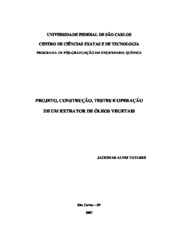Projeto, construção, testes e operação de um extrator de óleos vegetais
Abstract
Brazil is a rich country in biodiversity holding a great variety of plants,
being one of the main constituents - oil that has been searched by the industries,
especially, pharmaceutic, food and cosmetic. Among the plants with these
characteristics is the well -noted ginger, that has been used in treatments, from
stomach to rheumatism problems, in culinary as condiments and also in
perfumery.
Depending on the importance and application of the essential oil, in
literature, some types of extractors are found, being able to be cited the distillers
of the types Clevenger, soxhlet and the one that uses supercritical CO2.
Analyzing these extractors it was verified that these present advantages
and disadvantages that motivated this work, that has as objective to develop,
project, construct and operate an equipment that allows the extraction of the
essential oils, using the principle of dragging through vapor and that makes it
possible the manipulation of the variable pressure and temperature.
The developed and constructed equipment is composed by a boiler, a
chamber of extraction with three trays and a distiller, operating itself in the
following conditions: pressure in boiler 1.2 kgf/cm² the 3,6 kgf/cm²; pressure in
the chamber of extraction - 0,4 kgf/cm² the 3,6 kgf/cm²; temperature: 75°C 140°C;
average outflow of distilled in 0,831l/h and a average outflow of water in the
distiller of 125 l/h, trays - one, two and three and mass of ginger - 200g, 400g,
600g and 1200g. Optimum result gotten in this extractor was using three trays and mass of
400g of ginger, extracting a mass of 0,965g of oil, what it corresponds to a 1,7%
text.
In the comparison between these results and the gotten ones for the
Clevenger, the extracted oil text was 2,77 and 1.70%, respectively, showing that
the projected and constructed equipment extracted 63% more than the oil, in the
same conditions and with 3 hours to less of operation.
